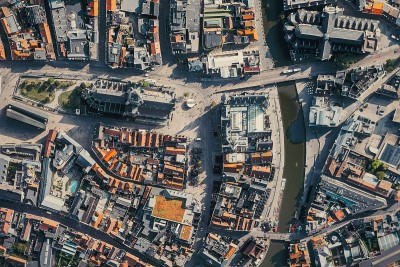Planning Tips
(vero;2024-June-15)
The plan was to visit Flanders, in particular the cities of Bruges, Ghent and Antwerp, pay a visit to Brussels and finish with a small trip to the Ardennes. But after two hectic weeks in Flanders and with the weather turning a bit rainy, we decided in the end to drive home early and leave camping in the Ardennes for another time.
It had been a long time since I last planned a trip to Western Europe and as usual I was trying to minimise costs: it turned out to be a bit of a challenge, so here are a few tips and observations:
Accommodation
 As expected we were not the only ones wanting to visit this charming (and dear) country. This meant that finding accommodation (at a reasonable price and self-catering) and at short notice (one month in advance) did not turn out to be that easy. We eventually found a small appartment for eight nights in the town of Dendermonde, conveniently located in the centre of a Ghent-Antwerp-Brussels triangle at the price of 420€ which was really good and put us in easy reach of each city.
As expected we were not the only ones wanting to visit this charming (and dear) country. This meant that finding accommodation (at a reasonable price and self-catering) and at short notice (one month in advance) did not turn out to be that easy. We eventually found a small appartment for eight nights in the town of Dendermonde, conveniently located in the centre of a Ghent-Antwerp-Brussels triangle at the price of 420€ which was really good and put us in easy reach of each city.
For the rest of the time, because we wanted to stay flexible as to our next stop (Ardennes) and be able to react to the vagaries of the weather, we could not really book in advance, which meant that finding something cheap with a roof over our heads turned somehow impossible. So we opted for camping instead. We spent our first three days on the coast to visit Bruges and believe us or not, finding a place accepting tents was not obvious. It is not for lack of campsites: the Belgian coast seems to be just a long succession of them, each uglier than the other, most catering for mobile homes or static caravans only. We eventually landed in Blankenberge, which is quite near Bruges and did the job, but we found its price quite high (26€ per night) for the little comfort it offered. We even had to pay for electricity although we were in a tent and had no cable to connect. I understand now why so many Belgians come to spend their holidays in France and enjoy the nice municipal campsites there!
The Belgian Ardennes looked more promising: many campsites along the river Meuse (Maas) are still from the old-fashioned sort, frequented by anglers and hikers, a little basic and friendly, all what we needed.
Museum visits
For us, used to free museums in England as well as in many French cities, we found the prices of Belgian museums fairly high: 10-20€ according to the museum, which add-ups quite quickly if (like us) you come specifically to wonder at Flemish primitives and Art-Nouveau.
Each town has its own city card (limited in time) which allows the visitor to combine visits, use public transport and lighten the bill. We were going for this, but after some research, we stumbled over the Belgian Museum Pass, costing 59€ per person (as of 2023) and giving access to many museums in the whole of Belgium for one year (not all museums are included though: check this page for a search by city).
We found the Museum Pass very advantageous and generous. You can buy it at participating museums, but it has to be registered on the internet after two visits (language might be an issue, the website is Dutch and French only). To do this, you have to create an account and load an ID photo of yourself. We created our accounts before leaving home and it went quite smoothly after we purchased the pass in Belgium.
See the Practicalities Section in the blog articles dedicated to each city for some basic info on their city card and a link for more details.
Although mentioned and strongly recommended on the websites of many museums, we never had to book a visiting slot upfront. We just showed up and could go in without waiting.
Driving in Belgium
 There are currently three LEZ zones (low emission zones) in Belgium: non-compliant vehicles are not allowed to enter them without a permit and there is a fine if caught without it. Most important, it is compulsory for foreign vehicles to be registered (for free) to enter the zones (even if they are compliant): this is a bit tedious because there is no common process. One has to register for each city individually, which means entering the same details and uploading the vehicle papers every time. Of course it is not necessary to register if you avoid city centres but this gave us peace of mind, nothing to worry about if we ever got lost and crossed the limit without realising it.
There are currently three LEZ zones (low emission zones) in Belgium: non-compliant vehicles are not allowed to enter them without a permit and there is a fine if caught without it. Most important, it is compulsory for foreign vehicles to be registered (for free) to enter the zones (even if they are compliant): this is a bit tedious because there is no common process. One has to register for each city individually, which means entering the same details and uploading the vehicle papers every time. Of course it is not necessary to register if you avoid city centres but this gave us peace of mind, nothing to worry about if we ever got lost and crossed the limit without realising it.
Click on the following links to access LEZ information for: Antwerp, Ghent and Brussels.
Parking was another headache. City centres and even suburbs are often out-of-bound or parking there is time-limited (mostly 3 hours). However, Ghent, Antwerp and Bruges have advantageous park & ride facilities, some of them free of charge, from which one can continue either using public transport or walking if not too far from the city centre.
See the Practicalities Section in the blog articles dedicated to each city for links to their P&R sites and detail of the ones we used (free of charge except in Antwerp where we paid 1€ for the whole day).
Brussels was another proposition. Many of the city P&Rs are subject to subscriptions reserved only for people who come to work in the capital (also on weekends) and linked to special public transport tariffs. The idea is good but less friendly for uninformed tourists who naively show up and find a closed barrier. So here again, one has to research well to find a P&R accessible without subscription.
We eventually ended up taking the train (Dendermonde-Brussels, 8€ per person Return on a Sunday): there are some interesting week-end tariffs, another option would have been the Museum Pass which provides discounts on trains as long as you travel outside of the rush hour.
Conclusion:
We were heading for four very large and touristy cities and I reckon that managing the flow of commuters and tourists is a big issue. But I regret the times when one could simply show up somewhere, find a hotel (preferably in the station district) easily and enjoy a city without thinking too much ahead (that is, if you want to get it right and watch your pennies). This has an impact on spontaneity and flexibility.
I cannot help thinking that IT which normally should facilitate our life is in fact sometimes becoming a real pain. It is great for researching but it has created an annoying "new bureaucracy": you have to register, identify yourself, download apps for everything and for nothing. You want a parking space? get the app! You want to buy a bus ticket? get the app! (or do your research upfront to find the next point of sale). You want to buy the Museum Card? get the app! In summary, one has to be constantly online and connected, something which we do not really have embraced yet. Furthermore we are very weary of all those apps for their lack of transparency and are not too keen on using them.
Want to read more? Go on to Flemish Impressions or go up to Background
$ updated from: Background.htxt Mon 28 Apr 2025 14:55:38 trvl2 — Copyright © 2025 Vero and Thomas Lauer unless otherwise stated | All rights reserved $



